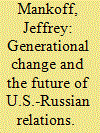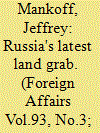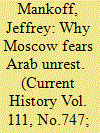|
|
|
Sort Order |
|
|
|
Items / Page
|
|
|
|
|
|
|
| Srl | Item |
| 1 |
ID:
188298


|
|
|
|
|
| Summary/Abstract |
Deference to Chinese aspirations in Eurasia is integral to Moscow’s pursuit of closer relations with Beijing. Yet China’s pursuit of regional, and ultimately global, influence is at odds with Russia’s longstanding ambition to maintain post-Soviet Eurasia as a strategic glacis and sphere of ‘privileged interests’. Russia has consequently sought to shape and channel Chinese engagement in line with its own interests, with mixed results. Disappointments with the effects of Chinese economic and political influence on Russian equities, limits on Sino–Russian coordination, and the interest of Eurasia’s smaller states contributed to a growing wariness on Russia’s part. The 2022 invasion of Ukraine and attendant confrontation with the West have left Russia more dependent on China, even as China itself has become more realistic about the prospects for Eurasian integration.
|
|
|
|
|
|
|
|
|
|
|
|
|
|
|
|
| 2 |
ID:
095897


|
|
|
|
|
| Publication |
2010.
|
| Summary/Abstract |
The Cold War has now been over for nearly two decades. In that time, a whole generation has grown up, both in the United States and Russia, with no memory of the conflict that defined world politics for half a century. Not only do today's college students have no memory of even the final stages of the Cold War, many were not even born when the Soviet Union collapsed at the end of 1991. For an ever increasing share of young people in both countries, seminal events from the Cuban missile crisis to Ronald Reagan's stirring call to "tear down this wall" occupy approximately the same place in individual historical consciousness as the assassination of Archduke Franz Ferdinand or the Battle of Waterloo. That observation may seem obvious, but it has profound implications for the future course of relations between the two former Cold War rivals.
|
|
|
|
|
|
|
|
|
|
|
|
|
|
|
|
| 3 |
ID:
090005


|
|
|
|
|
| Publication |
2008.
|
| Summary/Abstract |
The most dangerous issue in US-Russian relations remains the conflict over Georgia and potentially Ukraine, which by extension encompasses disputes over the role of NATO, arms control, democracy promotion, Kosovo, and a host of other ancillary problems. Similarly, Russian concerns about US plans to install anti-missile interceptors in the Czech Republic, Poland, and possibly Turkey turn on competing views of the Iranian threat as well as broader disputes over Eastern Europe's role in the post-Cold War balance. Energy is another issue causing headaches in both Moscow and Washington. In short, Medvedev/Putin and Obama/McCain will have more than enough to worry about - if they can devote sustained attention to fixing problems in the US-Russian relationship.
|
|
|
|
|
|
|
|
|
|
|
|
|
|
|
|
| 4 |
ID:
111916


|
|
|
|
|
| Publication |
2012.
|
| Summary/Abstract |
Pushed by the realities of domestic politics to proceed with plans to deploy a US missile defense (MD) capability in Europe, the Obama administration has made cooperation on MD a key element in its strategy for engaging both NATO and Russia. While addressing many of the shortcomings of the Bush administration's approach, the current US vision underestimates both the technical and political obstacles ahead. European states and NATO see MD as a lower priority, particularly in the aftermath of the conflicts in Afghanistan and Libya, and are unlikely to commit the resources necessary to making a shared NATO MD architecture a reality. Russia's cautious support for MD cooperation is based on a desire to create a more inclusive model of European security, an idea that has limited support in Washington and the European capitals. By trying to do too much with MD cooperation, the Obama administration risks the whole effort collapsing. Given domestic constraints, the administration cannot pull back from its European MD plans, but should nudge them off centre stage in its conversations on security with both NATO allies and the Russians.
|
|
|
|
|
|
|
|
|
|
|
|
|
|
|
|
| 5 |
ID:
094510


|
|
|
| 6 |
ID:
076626


|
|
|
| 7 |
ID:
181345


|
|
|
|
|
| Summary/Abstract |
Russia has come to occupy an anomalous position in Western strategic thought. While former US president Barack Obama dismissed Russia as a “regional power” following its 2014 occupation of Crimea and invasion of eastern Ukraine, both the Trump and Biden administrations have identified Russia as one of the United States’ principal rivals in an era defined by strategic competition among great powers.1 To a significant degree, though, the United States continues to think about Russia as more of a disruptor than a true great power rival. Though widespread, that view misreads both the nature and the durability of Russian power and underestimates the extent to which Russia remains a potent competitor whose preferences Western leaders will have to take into account.
|
|
|
|
|
|
|
|
|
|
|
|
|
|
|
|
| 8 |
ID:
130468


|
|
|
|
|
| Publication |
2014.
|
| Summary/Abstract |
Russia's occupation and annexation of the Crimean Peninsula in February and March have plunged Europe into one of its gravest crises since the end of the Cold War. Despite analogies to Munich in 1938, however, Russia's invasion of this Ukrainian region is at once a replay and an escalation of tactics that the Kremlin has used for the past two decades to maintain its influence across the domains of the former Soviet Union. Since the early 1990s, Russia has either directly supported or contributed to the emergence of four breakaway ethnic regions in Eurasia: Transnistria, a self-declared state in Moldova on a strip of land between the Dniester River and Ukraine; Abkhazia, on Georgia's Black Sea coast; South Ossetia, in northern Georgia; and, to a lesser degree, Nagorno-Karabakh, a landlocked mountainous region in southwestern Azerbaijan that declared its independence under Armenian protection following a brutal civil war. Moscow's meddling has created so-called frozen conflicts in these states, in which the splinter territories remain beyond the control of the central governments and the local de facto authorities enjoy Russian protection and influence.
|
|
|
|
|
|
|
|
|
|
|
|
|
|
|
|
| 9 |
ID:
189040


|
|
|
|
|
| Summary/Abstract |
Russia’s invasion of Ukraine has shocked Western observers. Seizures of territory, mass expulsions, and all-out assaults on Ukrainian culture hearken back to an earlier, darker era in European history—the era of empire. Indeed, the conflict may be the 21st century’s first imperial war. For President Vladimir Putin and many others in the Russian elite, Ukraine’s underlying provocation lay not so much in its aspiration to join NATO or the European Union, but in the very temerity it displayed in existing at all. Expressing ideas that are widespread among Russian thinkers and politicians, Putin has argued that Ukrainians and Russians are, as he put it in 2014, “one people, a single whole”—and that because he considers Ukraine part of Russia’s own historic patrimony, Moscow retains the right to conquer and reshape it with no regard for its inhabitants.
|
|
|
|
|
|
|
|
|
|
|
|
|
|
|
|
| 10 |
ID:
115606


|
|
|
|
|
| Publication |
2012.
|
| Summary/Abstract |
Throughout the upheaval in the Arab world, Moscow has been firmly on the side of the status quo. . .
|
|
|
|
|
|
|
|
|
|
|
|
|
|
|
|
|
|
|
|
|